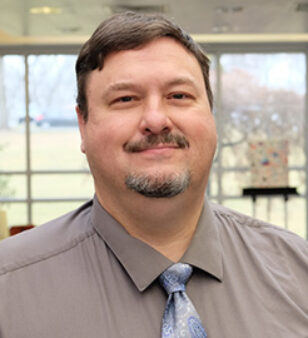
Education
B.A. in Chemistry and Biology, University of Northern Iowa
Ph.D. in Biochemistry, University of Iowa College of Medicine
Postdoctoral Fellowship, Brandeis University
Research Interests
My research uses techniques in Molecular Biology, Molecular Genetics, Biochemistry, Genomics, and Proteomics to understand how a protein called Replication Protein A (RPA) functions in DNA replication, Cell Cycle regulation, DNA damage recognition and repair in the Budding yeast, Saccharomyces cerevisiae. By developing a better understanding of the function of yeast RPA in these complex processes we will gain insights into the underlying causes of human cancers, and other diseases caused by defects in chromosomal DNA maintenance.
Courses Taught
Cell and Molecular Biology
Advanced Recombinant Techniques
Cell Culture and Microscopy
Advanced PCR Techniques
Junior Colloquium
Career Highlights
After obtaining a Ph.D. in biochemistry, Andre Walther earned a fellowship from the National Institutes of Health to do research in molecular genetics at Brandeis University. Since joining Cedar Crest College, he has maintained an active research lab focused on understanding how cells recognize and respond to DNA damage. Numerous students have presented their research at regional and national scientific conferences, and have earned summer internships at prestigious universities throughout the U.S.
Memberships
American Society of Cell Biology
American Society for Microbiology
Pennsylvania Academy of Sciences
Sigma Xi Research Honor Society
American Association for the Advancement of Science
Professional Advice
My advice to students would be for them to understand that the question can be just as important as the answer. It is important to learn how to ask good questions in order to gain valuable knowledge in life.
Why Cedar Crest?
I teach at Cedar Crest College because it allows me to interact with students in both the classroom and the lab from the very beginning of college. I greatly enjoy doing my research in collaboration with students. This allows students to use the scientific method in a real research lab, beginning as early as their first year of college. Students have made significant scientific discoveries in my lab and have been able to share their results with scientists across the globe at a number of research conferences.
Inspiration
My biggest inspiration is seeing the transformative effect that scientific research can have on a student. I have observed students that had early struggles in coursework, but then developed and matured once they were exposed to the excitement of research.
On Becoming a Teacher
As the son of an elementary school teacher and a college professor, it was probably predestined that I become an educator. I spent much of my early life self assured that I would never follow in the footsteps of my parents, but early required teaching experiences in graduate school led me to see that I really enjoyed teaching, especially in the research laboratory setting.